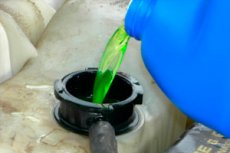Antifreeze vapor poisoning
Last reviewed: 16.09.2024

All iLive content is medically reviewed or fact checked to ensure as much factual accuracy as possible.
We have strict sourcing guidelines and only link to reputable media sites, academic research institutions and, whenever possible, medically peer reviewed studies. Note that the numbers in parentheses ([1], [2], etc.) are clickable links to these studies.
If you feel that any of our content is inaccurate, out-of-date, or otherwise questionable, please select it and press Ctrl + Enter.

Antifreeze is a coolant for the vehicle engine. The substance is water-based and contains liquid alcohols (ethylene glycol, methanol, propylene glycol). The latter are dangerous and poisonous for living organisms.
Symptoms of the antifreeze poisoning
Intoxication with antifreeze is possible by ingestion or exposure to vapors. Symptoms of pathological condition increase within a few hours, as the body metabolizes antifreeze. That is, the chemical is transformed into toxic substances: acetone, formaldehyde, glycolic and glyoxylic acid.
The main signs of antifreeze vapor damage to the body include:
- Intoxication.
- Dizziness and headache.
- Movement disorder.
- Speech impairment.
- Nausea and vomiting.
- Fatigue.
- Rapid breathing and shortness of breath.
- Inability to urinate.
- Tachycardia.
- Seizures.
In particularly severe cases, victims lose consciousness and fall into a comatose state. As the body digests the chemical, the liver, kidneys, lungs, brain and CNS suffer. Irreversible consequences occur 24-72 hours after poisoning.
Treatment of the antifreeze poisoning
First aid consists of gastric lavage and calling an ambulance. Until the arrival of medics, the psychological state of the patient should be carefully monitored. In the hospital, the patient is prescribed the first line of antidote to antifreeze - ethanol, fomepizole and a number of other drugs. Timely medication reduces the risk of developing irreversible consequences and life-threatening complications.
Specialized treatment in a medical facility may include the following:
- Gastric lavage: Once the victim is stabilized, gastric lavage may be performed to remove antifreeze residue. This procedure can be effective if performed within the first few hours after poisoning.
- Antidote administration: The antidote fomepizole (Antizol) can be used for poisoning by ethylene glycol contained in antifreeze. It helps to block the metabolism of ethylene glycol into toxic compounds.
- Detoxification: Detoxification is performed to remove ethylene glycol from the body. This may include hemodialysis, which removes toxic metabolites from the blood.
- Symptomatic treatment: Doctors may provide symptomatic treatment to manage symptoms such as nausea, vomiting, pain, and others.
- Condition Monitoring: The casualty will be continuously monitored with specialized medical devices to assess their condition, including respiratory status, pulse, blood pressure and blood oxygen levels.
- Maintenance of vital functions: It is important to ensure that the casualty maintains vital bodily functions throughout treatment and care.

